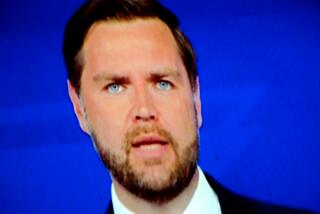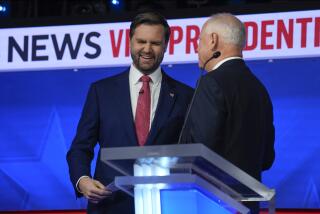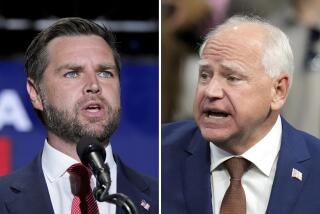Chance to Close ‘Stature Gap’ : GOP Primes Beleaguered Quayle for Crucial Debate
- Share via
WASHINGTON — “I’ll tell you one thing,” Dan Quayle says. “I’m going to enjoy much more being vice president than running for it.”
Call him tired. Call him edgy. Call his words understatement. He has been called just about everything. He is the young man in the squeeze, and all of America is about to turn on the TV and watch for itself.
Prone to hoarseness at the end of these long campaign days, Quayle moves up close for an interview so his words can be heard over the whistle of the chartered 727 Hoosier Pride. His smile still comes easy and wide, his eyes wrinkle up and smile too. The apple pink cheeks are unfaded.
“I know what has to be done,” he says with resolve about Wednesday’s live television debate with Democratic vice presidential nominee Lloyd Bentsen.
But these days, the 41-year-old Quayle has troubles enough to take the breath from a Nashville country-Western songwriter:
--His own handlers treat him as damaged goods, fearing he could stumble at any step and spoil George Bush’s lead in the campaign.
--He has been told by his advisers, painful as it may be, that he probably cannot settle the wildly conflicting claims about who he really is in the short time remaining before the election.
--He has inadvertently opened a sizzling new issue in the 1988 campaign, what is called in GOP headquarters as “the stature gap.”
So this weekend, behind closed doors at an undisclosed Washington location, the best talents the Republican Party can muster are assembling to try and pump Quayle full of the facts and strategies and confidence to survive and show up his critics on Wednesday.
“I know I have to be myself,” he says.
The sandy-haired senator from Indiana also knows that in the hurricane of publicity and hype of the last 6 1/2 weeks, a profoundly negative picture has emerged of him.
“You know, he is seen as this kid of privilege, who had everything handed to him his whole life. A lightweight, goof-off and not so bright. That’s the stereotype.”
The speaker here is not a reporter or a pollster or a Democrat, but one of Quayle’s top advisers.
But even those strongly fixed on this portrait acknowledge that public understanding of Quayle is hugely incomplete. Says this adviser: “We think there is a different Quayle there.”
Strikingly, however, there seems to be little confidence by the campaign in this other Quayle.
Prepare Detailed Script
The men and women assigned by Bush to manage and advise Quayle bind him tightly each day to a step-by-step script prepared by the headquarters command in Washington. They determine for him where he goes and who he sees, who will brief him and when he will be given time to rest. Most importantly, most everything he says is written for him.
He may have been a fireball as an impromptu speaker on the stump in Indiana. Stories and impressions from eyewitnesses vary. But, now, almost everyone agrees, including Quayle, that he is uneasy in his role as a national candidate required by his handlers to read prepared speeches. The words come out stilted and remote as if coming from someone else than the man on the podium.
Reporters tell of the urge to write “the speech said” rather than “Quayle said.”
The candidate says he accepts his role as the man “to reinforce the message” because it is part of the Bush game plan. “I’ve learned you get a game plan and you stick with it.”
But beneath this speech reader and hand shaker lurks what? Does he have a sense of humor? Aides say he does. But little evidence is permitted to show. His daily one-liners are all, or virtually all, written for him--and with the single purpose of disparaging Democratic presidential nominee Michael S. Dukakis. A sample: “When it comes to national defense, Michael Dukakis has gone from general confusion to Gen. Patton.”
Only Gaffes Original
Since so much of what he says is scripted, verbal gaffes become one of the few things one hears straight from the man himself. “We’re going to have the best-educated American people in the world,” he declared at a stop in Phoenix. In Bakersfield, he expressed his pleasure at serving on the ticket with “George the Bush.” Once he got tangled up and said he was “not born this century.”
Fairly or not, these have created the impression that if left on his own Quayle is sloppy expressing himself.
And this in turn has raised the stakes for Wednesday, when up to 100 million people will be listening as Quayle and Bentsen meet in Omaha. Not only is this shaping up as one of the most important vice presidential debates of modern times, but also one generating lopsided curiosity. Bentsen has stirred hardly a ripple of controversy in this campaign while Quayle has ridden a cyclone.
“The whole world is ready to pounce and say, aha. Nobody is going to cut him any slack whatsoever,” says one senior adviser. Like most of the Bush operatives interviewed for this account, this adviser said he would speak more freely if not identified by name.
Contact with reporters is essentially limited to occasional one-on-one airplane interviews lasting 10 to 20 minutes. In their growing desperation to find some purchase on his personality, reporters are increasingly taking wild stabs and asking him about subjects of their own interest. A reporter for a Dallas newspaper asked him about rock ‘n’ roll music (first record purchased: David Seville’s 1958 hit “Witch Doctor”). A Vietnam veteran from a Washington news bureau asked him about the war. A New York magazine writer who once taught philosophy inquired about what is said to be Quayle’s interest in Plato.
Mostly, though, what the public learns about the real Quayle comes from studying his voting record or from second-hand accounts.
“Everybody wants to know what a candidate is like,” says Ken Khachigian, one of his chief image advisers. “And contrary to what most people think, this is a basic guy with good values. He has three kids, a old black Lab (named Justice) that limps around. There is an old-shoe feel to his house. He goes to church. His kids attend public schools. There are bicycles lined up in the garage. He’s got a mortgage.
“Contrary to what most people think, we’ve got a guy here who can identify with tens of millions of Americans.”
Almost plaintively, Quayle echoes his frustration: “My name recognition has gone up, but people don’t know who I am. . . . I am a product of the public schools, my children go to public schools. I waited on tables at a sorority to earn extra money in college. But that’s not the image.”
Sometimes the campaign’s all-out, take-my-word-for-it salesmanship on Quayle finds extraordinary virtue in simple humanity.
Reporter: “What do you think of this guy?”
Bush operative: “Well, the more I know him the more I think he is a decent guy. He really likes his kids. . . . “
PR Fix on Hold
Depending on Wednesday’s performance, campaign officials said they will reevaluate whether to loosen the leash and let Quayle fend for himself. But he also has been briefed by the Bush brain trust that his ragged image probably will have to await until after the election for a full-blown PR fix.
“After the debate people certainly will know a lot more about me than they do now,” Quayle says. “On the other hand, their desire is not to know me, it’s to know George Bush and Michael Dukakis.”
For the time being, the official Bush line on Quayle is this: Notwithstanding the public opinion polls, he is doing well for the ticket, except where he is not, and then it does not matter.
Chiefly, the campaign is deploying him in smaller cities or putting him before carefully controlled friendly audiences in bigger cities. The idea, first, is to quicken the pulses of the GOP faithful. “He is really in demand by these people,” says a Texas operative for the campaign. Secondly, he is trying to generate favorable local news coverage as he travels.
The formula is simple and based on a clear understanding of what reporters are happy to report--escalating conflict. In this case, Quayle is armed virtually every day with a new or newly worded charge against Dukakis. The El Paso Times of last week shows how the plan can work. After a stop and 10-minute airport speech in the Texas border city, the candidate received a color picture and the largest headline of Page 1: “Quayle Comes to Town Swinging.”
Once in awhile, demonstrators will unnerve him or dominate the local news. But Charlie Black, a senior Bush adviser, said he reads the news clippings and sees news video from Quayle’s travels. “I’m telling you he’s batting .800,” Black says.
Hears Different Line
The national press that flies on Quayle’s plane--separated from the candidate by three blue curtains--often hears something different from the official line, however.
“I don’t think there is much question about it: We have a stature gap,” says one top adviser.
This kind of staff criticism of the candidate is surprisingly frequent. A close aide sneered at Quayle’s recent speech before the Los Angeles World Affairs Council. “That was a 30-minute speech; took him 40 minutes to read it.”
And even at their most earnest, his advisers can be backhanded. “Look, this guy is smart. I mean not in an IQ sense, but he’s street smart, political smart,” one said.
There may be a reason for this. The key operatives on Quayle’s staff, such as guru Stuart K. Spencer and message master Khachigian, are older than the candidate and have been around the likes of GOP legends such as Ronald Reagan and Richard M. Nixon.
“Now, part of the problem is that we married this cynical bunch of staff guys with a young stud,” says one of the aides.
The other part of the problem is tougher, however. And it is best expressed by the unpleasant knowledge that the Democrats--not his own party--are making mileage out of the lapel buttons now seen on Washington’s Capitol Hill: “President Quayle.”
More to Read
Get the L.A. Times Politics newsletter
Deeply reported insights into legislation, politics and policy from Sacramento, Washington and beyond. In your inbox twice per week.
You may occasionally receive promotional content from the Los Angeles Times.










